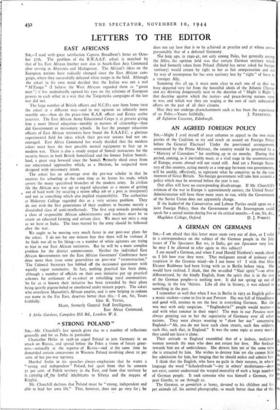LETTERS TO THE EDITOR
EAST AFRICANS
Sin,—I read with -great satisfaction Captain Broadbent's letter on Octo- ber 27th. The problem of the R.W.A.A.F. askari is matched by that of his East Afritan brother now also in South-East Asia Command after serving in Abyssinia and Madagascar. The African's ideas on the European nations have radically changed since the East African cam- paign, where they successfully defeated white troops in the field. Although the askari in his own mind decided that the Italian was not a real " M'Zungu " (I believe the West Africans regarded them as " green men ") it has undoubtedly opened his eyes on the relations of European powers to each other in a way that the Tanganyika campaigns of the last war did not.
The large number of British officers and N.C.O.s sent from home treat the askari in a different way—and in my opinion an infinitely more sensible one—than do the peace-time K.A.R. officer and Kenya settler reservist. The East African Army Educational Corps is at present giving him a more liberal education—notably in matters of citizenship—than did Government or missionary schools. In fact the younger education officers of East African territories have found the E.A.A.E.C. a glorious experimental field for ideas which their pre-war seniors had not en- couraged. East Africa Command has wisely decided that the modern askari must have the best possible mental equipment to face up to modern war. There is also a steady output of Somali instructors for the security forces in both British Somaliland and the former Italian Somali- land, a great step forward since the Somali fbrmerly shied away from • our educational approaches which, as a Moslem, he suspected were designed with missionary intent.
The askari has an advantage over the pre-war scholar in that he receives his schooling at the same time as he learns his trade, which covers' the many specialised branches of the modern army. In civilian life the African was too apt to regard education as a means of getting
• out of hard work (by securing a minor office job or a post as interpreter) and not as something which also implied responsibility. The authorities at Makerere College regarded this as a very serious problem. They do not wish the first generations of their students to become merely a dissatisfied class of semi-intellectuals. The first step towards producing a class of responsible African adMinistrators and teachers must be to create an educated farming and artisan class. We must not miss a step as we have in India. The lines started by the army should be followed after the war.
We ought to be moving very much faster in our post-war plans for the askari. I do not for one minute fear that there will be violence if he finds not all to his liking—as a number of white agitators are trying to hint in our East African territories. But he will be a more complex problem for the district commissioner. Neither the individual East African Governments nor the East African Governors' Conference have done more than issue some generalities on post-war " reconstruction." The Colonial Secretary has fobbed off the occasional questioner with equally vague statements. In fact, nothing practical has been done, although a number of officials on their own initiative put up practical schemes for settlement of ex-askari or rebuilding rural communities. So far as is known their initiative has been rewarded by their plans being quietly pigeon-holed or smothered under minute papers. The askari who overthrew Mussolini's African empire, and is now helping to redeem our name in the Far East, deserves better than this.—I am, Sir, Yours Major, formerly General Staff Intelligence, East Africa Command.
8 Airlie Gardens, Campden Hill Rd., London, W. 8.


























 Previous page
Previous page